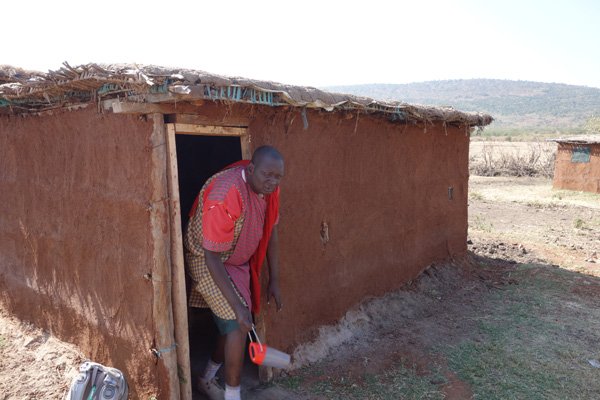Travel is a wonderful way to gain perspective.
Whenever we become immersed in another culture, we have a chance to think about our own environment.
I recently had a meeting in Kenya, and one of my colleagues organized a postmeeting safari for us that included an opportunity to live in a Maasai village (www.semadepcamp.
com): three travelers in a 10-by-10-foot hut of sticks and limbs plastered with a dried mixture of mud and cow dung.
A neighbor two cottages over invited us to their home to see a typical family arrangement. Their dung hut was a bit bigger, maybe 15-by-15 feet. They had a small area for a cooking fi re, about four feet square. The smoke stung my eyes. On either side of the fi re were bed mats - father on the left, mother on the right.
Three children slept with their parents and the two smallest slept on the fl oor in between. At the foot of the mother’s bed was anL-shaped stall where fi fteen goats and two young calves stayed inside with the family each night, safe from predators.
Village women walk daily to the creek to bring water. They chop sticks and gather dung for building and repairing their homes.
The men are in charge of the cows, sheep and goats.
Some stay up all night by a fire guarding the fl ock. They also protected us, especially the evening when elephants roamed our camp. Men and boys take the fl ocks up the nearby mountain to graze, returning at evening, carrying with them neither food nor water during their day’s work.
No electricity, no plumbing, no paved roads,no cars. I could go on about what they don’t have. But let me say something about what they do have.
The people of this village have a deep sense of community. They know they belong to something greater than themselves.
They belong to that place - to the land, its animals and resources. They belong to their tribe. They have a deep sense of identity, of knowing who they are and what they will be doing with their lives - lives that are deeply interconnected - meaningful and purposeful.
You get no sense of anxietyamong them about what they should do or who they should become.
When you travel you remember what’s truly important - our most valued “possessions” are the people in our lives. I am so thankful for relationships of love and friendship: for a network of family and community where I belong and have a sense of identity and place and meaning, and for a relationship with the divine living mystery of God, and through God, an intimate connection with all humanity and creation.
I’m also thankful forthose other things - like electricity and plumbing, washers and dryers and cars. It struck me while in Africa, living with people without these conveniences, how much time these things save us. Yet why do so many of us always seem so rushed, anxious and so short of time? We are a busy and rushed people.
Time seems diff erent in Africa. Africans don’t seem pushed and stressed by time. Even the walk of the Maasai has a slow, dignifi ed grace.
I returned home with an appreciation for another culture as well as a renewed thankfulness for my own life. Travel opens perspective.
One of my best friends from childhood married a woman from Sweden.
He has lived there since, returning home often to visit. When we catch up he likes to off er me his thoughts as a native Mississippian looking at home from a Swedish perspective.
He is incredulous that we are still debating the basichuman right of universal access to health care.
“Where are the Christians?” he chides me. (He was raised a devout Southern Baptist.) He decries the continuing racism in the U.S. that seems so glaring from his European perspective. He is perplexed by our gun culture and the level of fi rearm accidents and violence.
Travel broadens perspective. African friendships can inspire us to live with less attachment to our possessions and with a lighter sense of time.
They invite us to share and to give, for we have more than our share of things.
They can motivate us to embrace the true treasures - relationships and community - and to celebrate our deepest identity as God’s beloved children. As God’s children, we all thrive most deeply when we simply love God and love our neighbor as ourselves. That’s a universal value.
LOWELL GRISHAM IS AN EPISCOPAL PRIEST WHO LIVES IN FAYETTEVILLE.
Opinion, Pages 11 on 08/25/2013

